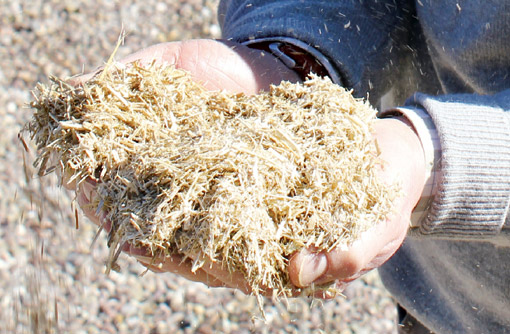New poultry bedding from miscanthus

Miscanthus is normally associated with renewable energy, but it is also finding favour as a bedding material, as Poultry World discovered
Broiler bedding performs a number of valuable functions that play a key role in ensuring the well-being and physical performance of the birds.
In particular, it absorbs excess moisture from droppings and drinkers, reduces contact between birds and manure, minimises ammonia levels, and insulates and protects chicks from concrete floors.
“We know broilers need the right environment to perform to their genetic potential,” says industry specialist David Hopwood, who has more than 30 years’ experience in managing and advising poultry units across the UK and overseas. “And we know the mixture of bedding, droppings and moisture that makes up litter is ideal for bacterial growth and ammonia production.
“We also know we can manage litter conditions to minimise both this and the pododermatitis that has become an issue with increasing poultry feet sales to overseas markets. But we can only do so if we have bedding that allows us to create the best possible litter conditions.
“That’s why I’m so excited about the new material I’ve been evaluating over the past 12 months. More absorbent, more consistent and very much softer than traditional beddings, it promises to be a cost-effective alternative to wood shavings. It is also superior to the ‘recovered wood’ from a variety of recycling sources that seems to have found its way into poultry litter in recent years.”
Early test results from Harper Adams University College show the bedding – developed and produced by European miscanthus specialists, International Energy Crops and due to be launched at this month’s British Pig and Poultry Fair – to be every bit as absorbent as white wood shavings.
Lab analysis by poultry specialists at the Minster Veterinary Practice also establishes that it is completely salmonella-free. In addition, it carries a considerably lower microbiological load than average – less than 3,500 total colony forming units/gram compared to common bedding material levels of 5,000-10,000cfu/g.
Commercial trialling on a number of substantial UK broiler units is demonstrating the practicality and value of the material.
Unlike other by-products currently used in broiler litter, Soft-Lay – as the new material is called – is 100% natural and produced specifically for the task from carefully shredded and screened UK-grown miscanthus.
Grown on an expanding acreage across the country, the high sustainability perennial crop is primarily used as biomass for energy-generation, ensuring a good year-round supply at stable values.
As well as being able to absorb up to three times its own weight in moisture, the internal honeycomb structure exposed in shredding makes for excellent insulation and comfort. Weight-for-weight, it has been found to bed double the area of wood shavings at standard 15mm, 30mm and 50mm litter depths.
Soft-Lay also comes with a guaranteed moisture content of 10-15% and a consistent particle size. It also offers complete traceability and bio-security.
“Just about everything that goes into a broiler house these days – chicks, feed, water, staff, pharmaceuticals – has to be both biosecure and fully traceable,” Mr Hopwood observes.
“So it’s extremely encouraging to find a bedding material that is subject to regular batch testing for microbial quality and traceable back to its source on British farms, as well as highly effective and consistent.”
CASE STUDY: Hilton and Wayne Norman, The Bow, Carlisle, Cumbria
At The Bow near Carlisle, Hilton and Wayne Norman have been using the new bedding for the last six crops of 200,000+ birds they grow for Frank Bird Poultry.
One of the business’s top growers, they used chopped straw and wood shavings before coming across the miscanthus alternative 12 months ago.
Initially, the brothers couldn’t see how anyone could make a good bedding material from the bamboo-like miscanthus they saw IEC growing in Shropshire.
“It must be down to the shredding process as Soft-Lay has proved really valuable for us,” says Hilton. “It’s very uniform and provides just the soft, dry bed we need for day-old chicks. It holds a lot of air, providing a comfortable, warm environment for the chicks to settle into.
“Because it starts off so dry and has such good moisture absorption it continues to work well throughout the crop. We also appreciate its clean and efficient delivery in the company’s own moving floor lorries.
“Added to this, it doesn’t stick to the floors so it’s easy to clean out. And we find it’s better for field spreading than wood shavings.”
